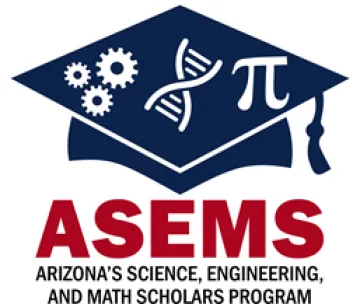The Graduate College supported UROC research programs (McNair, UROC-PREP, AWARDSS-PLUS, SRI, MHD, MARC, STARS) share one application, noted as the "UROC Application" in the left menu. Our affiliate research program (noted with an asterisk *), Biosphere 2, maintains an individual program application. Visit their website for more information.
Year-Round Programs | |
Image

| The Ronald E. McNair Postbaccalaureate Achievement Program (McNair) is a two-year undergraduate research and grad school prep program for U of A main campus students who are first-generation college students and low-income (FGLI) or Underrepresented students in graduate education. The goal of McNair is to prepare students for a PhD in the hopes of creating a more just academia. McNair is an interdisciplinary program, so students from any major are encouraged to apply! However, since McNair prepares students for PhD and Master's, students interested in professional degrees (MD, DVM, JD, etc.) would be best served by a different program. Contact: Victoria Juvera |
Image

| UROC-Prep is a year-round undergraduate research and mentoring program for U of A students who face challenges or barriers to graduate education and have interest in pursuing a graduate degree (Master's or PhD). This program is for U of A students only and is open to juniors and seniors of all disciplines, including social science, humanities, fine arts, and STEM. There is a spring semester writing intensive component, that leads into summer research, and concludes with a one-unit graduate school preparation course in the fall. Students interested in professional school (i.e., MD, JD, DVM) are not eligible. Contact: Karla Smith |
Image

| Access, Wellness, and Relational Determinants of Student Success: Publishing, policy, practice, Leadership and life-long learning for Underrepresented Students (AWARDSS-PLUS) Contact: coe-awardss@email.arizona.edu |
Image

| ASEMS Scholar Training Academy for Research in STEM (STARS) The STARS program is a year-round undergraduate research and mentoring program for U of A ASEMS students who face challenges or barriers ito higher education and have interest in pursuing a doctoral degree (PhD). Funded through a grant from the Gordon and Betty Moore Foundation, STARS recruits ASEMS' students in STEM fields and assists them in developing the skills necessary to excel in their academic studies and provides assistance with admission into a doctoral program. Students interested in professional school (i.e., MD, JD, DVM) are not eligible. Contact: Leah Callovini |
Image

| Maximizing Access to Research Careers (MARC) Contact: Cindy Neal |
Summer Programs | |
Image

| Summer Research Institute (SRI) SRI, funded by The University of Arizona Graduate College, is a summer only undergraduate research program for juniors and seniors (with a minimum of 1 semester before gradation). It is open to all disciplines, including social science, humanities, fine arts, and STEM. In addition to U of A students, SRI also accepts students from other universities dependent upon funding availability. Students interested in professional school (i.e., MD, JD, DVM) are not eligible. Contact: Karla Smith |
Image

| Minimizing Health Disparities (MHD) MHD, funded by The University of Arizona Graduate College, is a summer only undergraduate research program that focuses on health issues that affect communities in a disproportionate manner. The program is open to junior or senior biomedical majors interested in continuing their education at the PhD level. Students interested in professional school (i.e., MD, JD, DVM) are not eligible. In addition to U of A students, MHD also accepts students from other universities dependent upon funding availability. Contact: Karla Smith |
Image

| *Biosphere 2 Research Experiences for Undergraduates NSF REU U of A's Biosphere 2 facility is the site of this summer-only research experience. By using a multidisciplinary approach (involving disciplines such as hydrology, geology, geochemistry, ecology, biology, physics, engineering, and atmospheric sciences) research teams focus on understanding how earth systems respond to environmental change. Open to freshmen, sophomores, and juniors. Application Deadline: March 1 Contact: Dr. Katerina Dontsova |

